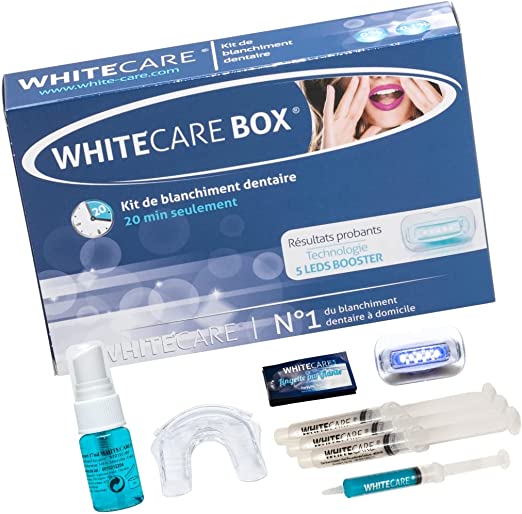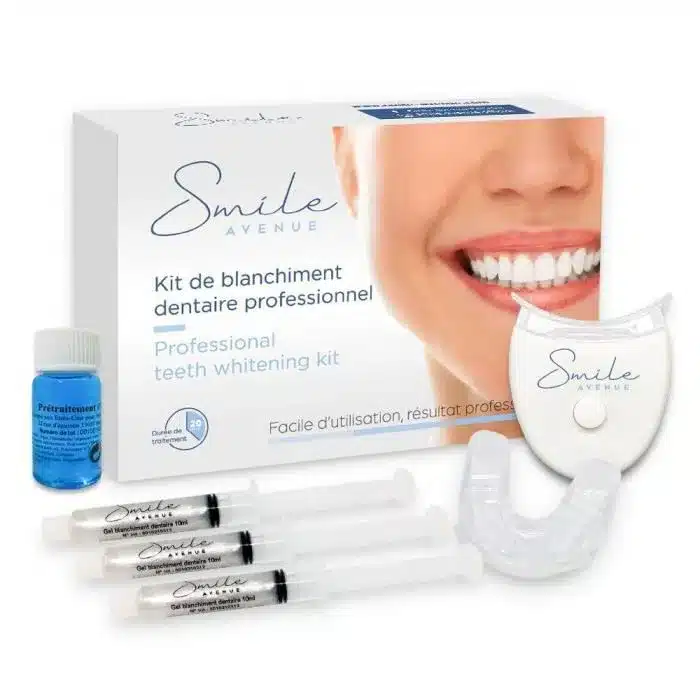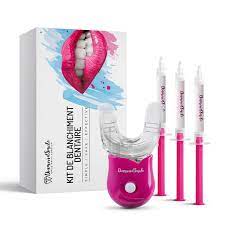Comparison of the best solutions for teeth whitening
Discover our selection of the best at-home teeth whitening treatments. However, be aware that teeth whitening can carry risks, and it is essential to consult a dentist before starting any teeth whitening treatment.

Our opinion on teeth whitening
Avant de vous lancer dans un blanchiment dentaire à domicile, il est important d’en parler avec votre dentiste traitant. Ce dernier pourra lui-même vous faire un blanchiment si vous en avez vraiment besoin. Il existe également différents kits pour réaliser un blanchiment chez soi que nous allons comparer dans cet article.
The risks of doing at-home teeth whitening
Whitening teeth at home or in a specialized clinic is not trivial; it is important to discuss it with your dentist beforehand. Indeed, teeth whitening is not recommended for:
– Children and adolescents
– Pregnant women
– People with hypersensitivity of the teeth (e.g., teeth sensitive to cold)
– People with cavities
– People whose teeth have lesions.
At the European regulatory level, teeth whitening products fall under the category of cosmetic products. Due to the presence of hydrogen peroxide and its dangers, the maximum allowed concentration in Europe is 6% hydrogen peroxide. Teeth whitening or lightening products sold online or in pharmacies must not exceed 0.1% hydrogen peroxide. Only dentists can use whitening products containing between 0.1% and 6% hydrogen peroxide.
Therefore, we advise you to choose a whitening kit made in Europe that complies with European legislation and to avoid cheap Chinese products.
When practiced too frequently, there are a number of risks associated with teeth whitening, such as:
- Enamel alteration and weakening of the teeth
- Development of dental hypersensitivity
- Demineralization of the teeth
- Mucosal irritation related to the concentration of hydrogen peroxide.
How does teeth whitening work?
Teeth whitening is relatively simple to perform; using a tray, a gel is applied to the teeth that, depending on the duration of contact with the teeth, will achieve whitening. The whitening is done through a chemical process, primarily using hydrogen peroxide, which, depending on its concentration, allows for more or less significant whitening. Some professionals even use a UV lamp as an additional measure for a more effective result. As for at-home whitening solutions, these are often much lower in hydrogen peroxide than the solutions offered by your dentist.
What is the best teeth whitening kit?
It is difficult to determine a single best teeth whitening kit, as it depends on individual preferences and needs. There are several teeth whitening kits available that are very popular and highly rated by users. Here are some of the best teeth whitening kits:
- White Care Teeth Whitening Kit: This kit contains thermoplastic trays, a whitening gel, and an LED activator for quick results. It is easy to use at home and has received many positive reviews.
- Smile Avenue Teeth Whitening Kit: This kit also contains thermoplastic trays and a professional-grade whitening gel. It is safe for the teeth and easy to use, with visible results in just a few applications.
- Diamond Smile Teeth Whitening Kit: This kit contains a whitening gel made from natural ingredients, along with an LED lamp to activate the gel. It is easy to use and has been praised for its effectiveness and gentleness on the teeth.
It is important to note that teeth whitening kits can vary in terms of whitening gel concentration and application method, so it is essential to do thorough research and consult a dentist before using a home teeth whitening kit.
What is hydrogen peroxide?
Hydrogen peroxide is a bleaching agent commonly used in teeth whitening treatments. It is a chemical compound made up of hydrogen and oxygen atoms (H2O2). Hydrogen peroxide can penetrate tooth enamel and break down staining molecules that have accumulated on the teeth, which can help remove stains and improve tooth color.
In teeth whitening treatments, hydrogen peroxide is typically used at concentrations ranging from 10% to 40%. Higher concentrations are generally used for in-office whitening treatments, while lower concentrations are used in at-home whitening kits.
It is important to note that hydrogen peroxide can cause temporary tooth sensitivity and gum irritation when used at high concentrations or for extended periods of time. That is why it is important to discuss the benefits and risks of teeth whitening with a dentist before starting any teeth whitening treatment.
How much does teeth whitening cost at the dentist?
The cost of teeth whitening at the dentist can vary based on several factors, such as the region, the dental office, the whitening method used, and the extent of the treatment. In general, the cost of teeth whitening at the dentist can range from £300 to £600.
However, it is important to note that teeth whitening is considered an aesthetic procedure and is generally not reimbursed by health insurance. Some mutual insurance companies may offer partial or full coverage for teeth whitening treatments, so it is advisable to check with your insurer before making an appointment with a dentist for teeth whitening.
It is also important to discuss treatment options and costs with your dentist before deciding to proceed with teeth whitening, in order to fully understand the benefits and potential risks as well as the associated costs.
Are teeth whitening kits really effective?
Teeth whitening kits can be effective in removing stains from teeth and improving the color of tooth enamel. However, their effectiveness depends on the concentration of the product, the duration of the treatment, and the method of application.
At-home teeth whitening kits may not be as effective as teeth whitening treatments performed by a dentist, as over-the-counter whitening products typically have a lower concentration than those used in dental offices.
Moreover, the success of teeth whitening treatment also depends on the cause of the dental stains. Stains caused by smoking, coffee, or tea are generally easier to remove than those caused by factors such as dental fluorosis or antibiotics.
It is important to note that teeth whitening can have side effects such as tooth sensitivity, gum irritation, and enamel erosion. Therefore, it is important to discuss the benefits and risks of teeth whitening with a dentist before starting any teeth whitening treatment.
What is the best teeth whitening technique?
There is no one best teeth whitening technique that suits everyone, as it depends on several factors such as the cause of dental stains, tooth sensitivity, and personal preferences. Here are some common teeth whitening techniques:
- Teeth whitening with carbamide peroxide or hydrogen peroxide: This technique involves applying a whitening gel containing carbamide peroxide or hydrogen peroxide to the teeth using a dental whitening tray. This technique can be performed in a dental office or at home under the supervision of a dentist.
- Laser teeth whitening: This technique involves applying a whitening gel to the teeth and then activating the gel using a laser beam. This technique is typically performed in a dental office.
- Teeth whitening with activated charcoal: This technique involves applying activated charcoal to the teeth to remove stains. However, there is debate about the effectiveness and safety of this teeth whitening method.
It is important to discuss with your dentist the teeth whitening treatment options that are best suited to your particular case. It is also important to follow the instructions of the dentist or the manufacturer of the teeth whitening kit to avoid unwanted side effects.
How often can teeth whitening be done?
The frequency at which teeth whitening can be performed depends on several factors such as the cause of dental stains, the teeth whitening method used, and the overall dental health of the person.
In general, it is recommended to wait at least six months to a year between teeth whitening treatments to allow the tooth enamel to recover and minimize the risk of tooth sensitivity or gum irritation.
It is also important to maintain good oral hygiene to prolong the results of teeth whitening. This can include regular brushing of teeth, using dental floss, using mouthwash, and regular visits to the dentist for check-ups and professional cleanings.
How much does at-home teeth whitening cost?
The cost of a home teeth whitening kit varies depending on the brand and features of the kit. In general, the cost of a home teeth whitening kit can range from £20 to £200.
It is important to note that at-home teeth whitening kits can vary in terms of quality and effectiveness. Therefore, it is recommended to do thorough research before purchasing an at-home teeth whitening kit.
It is also important to note that using an at-home teeth whitening kit can carry risks and side effects such as tooth sensitivity or gum damage. Therefore, it is recommended to consult a dentist before using an at-home teeth whitening kit to determine if it is suitable for your oral health and to obtain advice on how to use the kit safely.
Does teeth whitening hurt?
In general, teeth whitening should not cause significant pain. However, some people may experience temporary sensitivity of the teeth and gums during or after the treatment.
Tooth sensitivity is generally caused by the whitening agent penetrating the dentin, the layer of tissue beneath the tooth enamel. This can lead to temporary irritation of the dental nerves, resulting in pain or sensitivity.
However, there are several ways to minimize sensitivity associated with teeth whitening, such as using whitening products with a lower concentration of peroxide, applying a desensitizing gel before or after the treatment, or using custom trays to limit the product's contact with the gums.
What are the risks of buying a low-quality teeth whitening kit?
Purchasing a low-quality teeth whitening kit can pose several risks to dental health. Here are some of the potential risks associated with using low-quality teeth whitening kits:
- Tooth sensitivity: Low-quality whitening kits may contain abrasive chemicals or high concentrations of peroxide, which can damage tooth enamel and cause tooth sensitivity.
- Gum irritation: Low-quality teeth whitening products can also cause gum irritation due to excessive exposure of the whitening product to the gum tissues. This can lead to pain and inflammation of the gums.
- Uneven results: Low-quality whitening kits may not provide uniform or long-lasting results, which can leave teeth stained and uneven. Low-quality whitening products may also be ineffective at removing certain stubborn stains or whitening teeth deeply.
- Dental infection: Using low-quality teeth whitening kits can also cause dental issues such as cavities, infections, and gum lesions if the teeth are not properly cleaned before using the product.
Ultimately, it is recommended to consult a dentist before using any teeth whitening products and to choose high-quality products made in Europe to minimize potential risks to dental health. In this comparison, we have favored recognized European products that comply with European legislation. Please note that some partnership agreements have been made with certain companies, and thus we may earn commissions from certain suppliers. These commercial partnerships do not compromise our independence or our desire to present you with the best solutions for teeth whitening.



